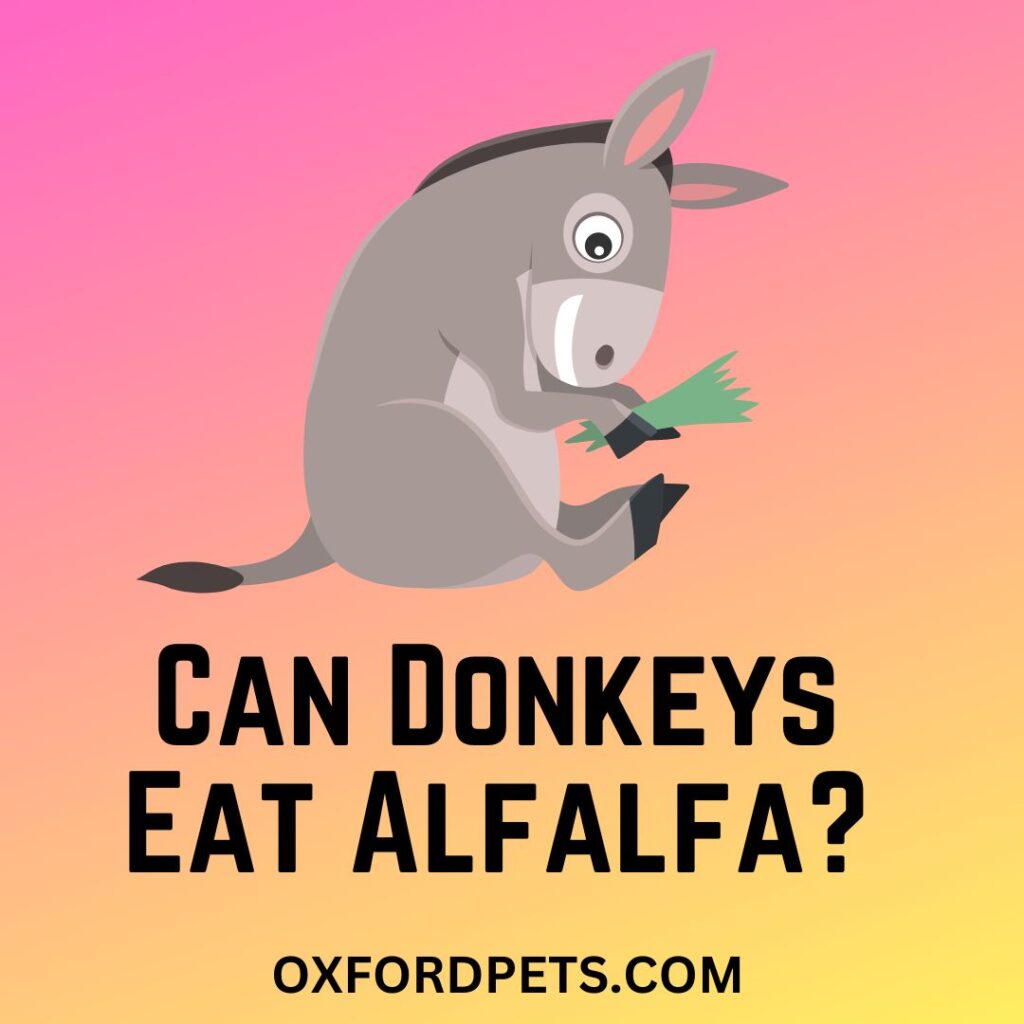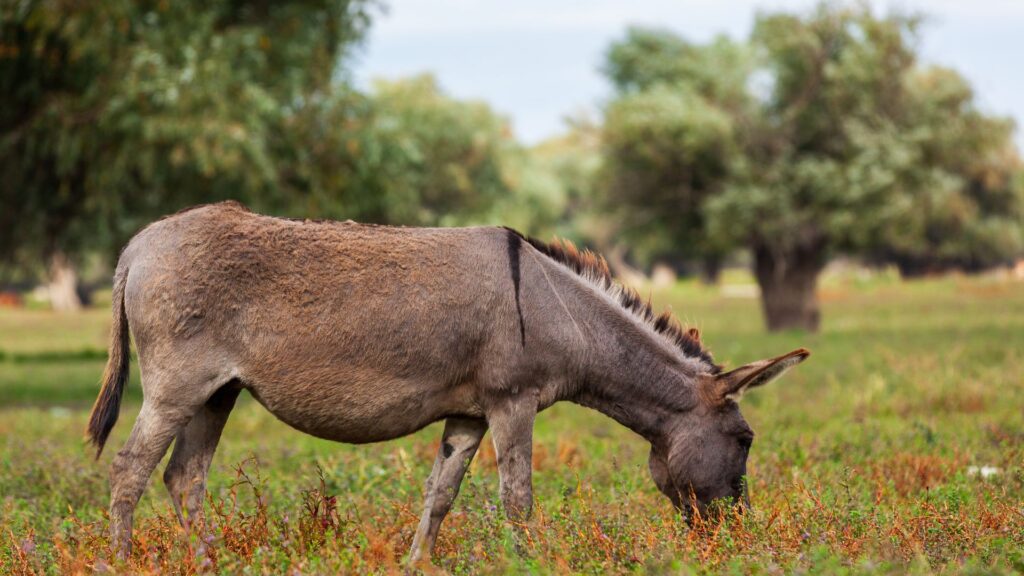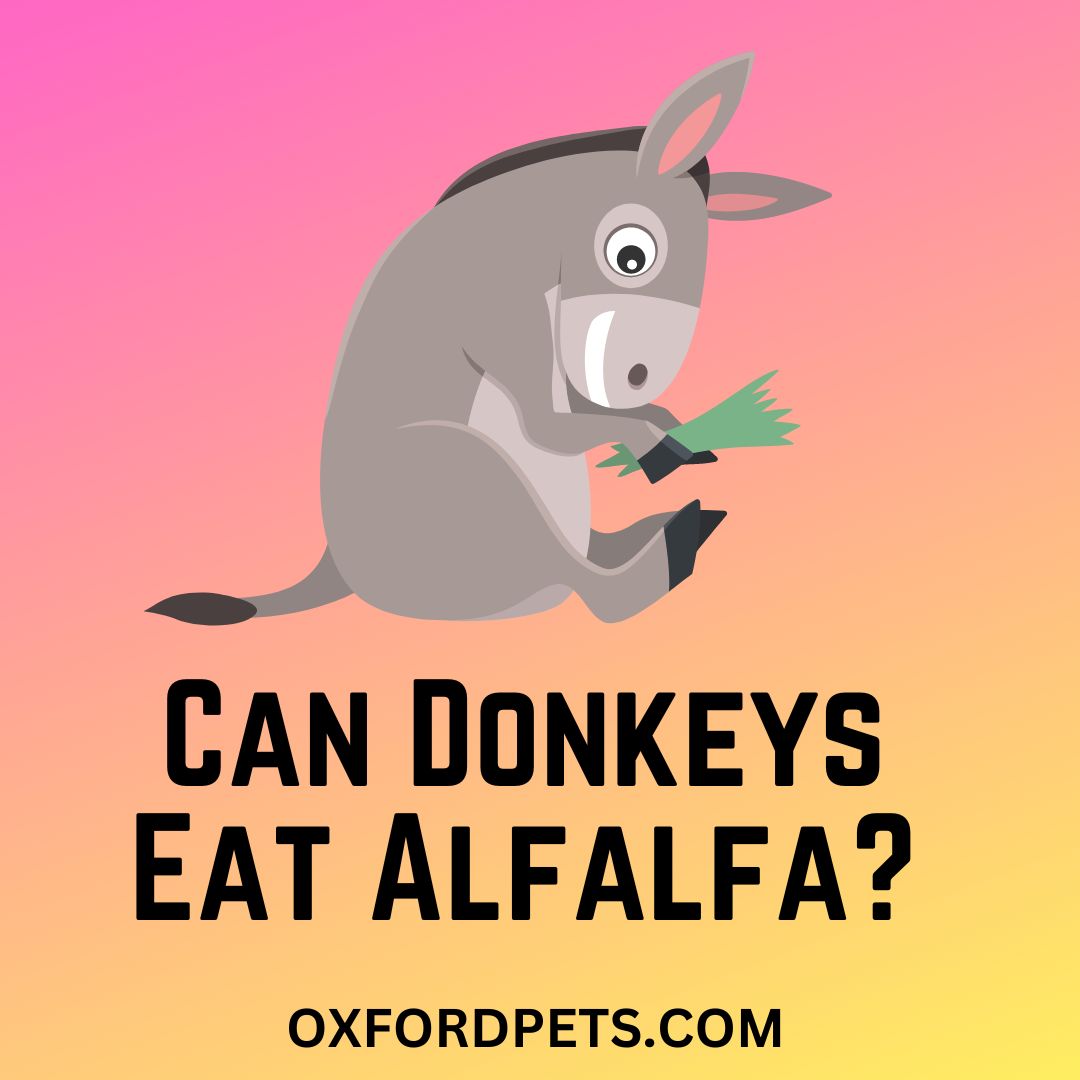It is better not to feed alfalfa to donkeys. The reason behind this – alfalfa has a lot of protein. And this amount of protein is much more than the protein requirement of donkeys. In fact, it has a protein concentration of more than 17%. On the other hand, if you look at a donkey’s protein requirement it is only 3.5% to 7.4%.
Although alfalfa is non-toxic for donkeys, the nitrogen present in it is too high for a donkey. As donkeys cannot excrete excess nitrogen, consuming alfalfa can cause trouble for them. The most common results for donkeys after consuming alfalfa include laminitis and obesity.
Pet donkeys are already prone to obesity due to efficient nutritional physiology. Therefore, it does not take much, by means of excess spoiling, to get along with such conditions.
Obesity in donkeys can result in health issues like strain in organs, laminitis, and hyperlipidemia. Laminitis is a very painful disease that causes inflammation in soft tissue. It is hard to treat this disease and sometimes fatal.
Hyperlipidemia is a condition that affects the organs of donkeys and can result in death. Hence, it is better not to feed alfalfa to donkeys no matter what.

Contents
What is Alfalfa?
- Alfalfa, a perennial flowering plant of the legume family (Medicago sativa), is known as lucerne in other countries.
- This plant is highly valued as animal feed and is commonly used for grazing, hay, silage, and pellet form due to its nutritional benefits.
- It is rich in essential vitamins and minerals such as vitamins K, C, B, iron, magnesium, and copper.
- Its high crude protein content makes it an excellent choice for most farm animals, except for donkeys.
- Although this may seem confusing, there is an interesting explanation that follows.
Donkeys’ Unique Nutritional Needs
Recycling Nitrogen
- One notable adaptation of donkeys is their capacity to recycle nitrogen internally, which is a skill that horses and ponies lack.
- Instead of excreting excess nitrogen as urea, donkeys can reabsorb this compound and repurpose the nitrogen as needed.
- This mechanism can be adjusted based on the amount of protein and nitrogen required in the diet.
- Compared to mature horses, the crude protein requirement for donkeys is generally lower, estimated to be around 3.8-7.4% of their diet.
Water Needs
- Usually, horses and ponies decrease their feed intake if water consumption is restricted.
- Donkeys exhibit the same behaviour, but what distinguishes them is that the digestibility of the consumed feed actually increases rather than decreases, unlike horses and ponies.
- Additionally, during dehydration, donkeys decrease their resting metabolic rate to conserve water, which leads to a reduction in their water requirements for thermoregulation.
Forage and Fiber
- To ensure optimal nutrition for donkeys, it’s important to provide them with high-fibre forages that have low nutritional value.
- Clean straw is an excellent choice, as it closely resembles the type of feed donkeys would naturally consume in the wild.
- Compared to mature grass hay, straw has a lower calorie content, ranging from 0.73 to 0.8 Mcal per pound, which means you can feed a larger quantity.
- Additionally, straw is significantly lower in protein than grass hay and should be preferred over alfalfa, which has a much higher protein content.
Donkeys Eat Grass, Browse, and forbs
- Due to limited food availability in their natural habitat, donkeys have adapted to consume more than just grass.
- They also enjoy feeding on browse, including woody shrubs, trees, and broadleaf plants, forbs such as flowering plants.
- Donkeys have a strong inclination towards browsing and can become destructive when forage is scarce.
- One way to prevent this is by providing safe sources of browse, such as tree branches, twigs, and brambles, which can help satisfy their desire to browse and decrease destructive behaviours.
Supplementation
- Donkeys, like horses, require micronutrients such as trace minerals and vitamins to supplement their forage.
- However, ration balancers commonly used for horses and ponies may not be appropriate for donkeys as they can add excess calories and protein.
- Instead, ration-balancing supplements with a recommended serving size of 3-4 ounces are often a more suitable option.

What Are The Risks Of Feeding Alfalfa To Donkeys?
While alfalfa offers various health benefits as a nutrient-dense vegetable rich in magnesium, copper, Vitamin K and folate, it is not recommended as a feed for donkeys. Instead of providing nourishment, alfalfa can potentially cause serious health issues for donkeys, such as:
Risk of obesity
Alfalfa has been shown to contribute to obesity in donkeys, particularly in those that are overweight or kept as pets. Obesity can be detrimental to donkey health, as it increases the risk of hyperlipidemia, a condition caused by excessive fat in the body.
Hyperlipidemia can result in organ failure and even death if left untreated. Preventing obesity in donkeys is preferable to treating it, as rapid weight loss in overweight donkeys may lead to hyperlipidemia.
Laminitis
Donkeys may develop a painful and recurring condition called laminitis if they consume alfalfa. Laminitis affects the tissues that connect the hoof wall to the pedal bone, which may cause the pedal bone to rotate or sink within the foot.
The pain associated with laminitis can be subtle, so it is important to watch for any behavioural changes in your donkey to identify the problem promptly. Signs of laminitis may include increased insulin levels, depression, tiredness, heat in the hooves, and others.
Can Donkeys Eat Alfalfa Hay?
Feeding alfalfa hay to donkeys is not recommended. Instead, good-quality grass hay is a suitable option. Meadow hay, a natural mixture of grasses from old pasture, and seed hay, made from crop stems left after grain harvest, are also beneficial for donkeys.
It’s crucial to avoid feeding donkeys hay that contains ragwort, as it’s harmful to their health. Dried ragwort can be challenging to differentiate from regular hay. Additionally, it’s important to store fresh-cut hay in a dry barn for at least three months before feeding it to donkeys.
Best Forage for Donkeys: Grass Hay or Straw?
Donkeys can make excellent farm companions as they thrive on low-grade fodder that might otherwise go to waste, making them a cost-effective option that won’t compete with other livestock for food. Donkeys do best on high-fibre fodder, like barley straw, which is low in sugar and similar to their natural grazing.
It’s important to ensure that their straw is fresh, dry, and free of dust and mould. In the winter, it’s acceptable to supplement their diet with hay and other forage higher in sugar and starch, but barley straw should still make up at least 50% of their diet. Grazing on pastures can be allowed, but only as a supplementary component, not as the main source.
While it’s okay to give them occasional treats like fruits and vegetables, such as apples, carrots, and bananas, it should be done carefully. It’s also crucial to provide them with clean and fresh water available 24/7.
Harmful Foods for donkeys
There are several things that can be toxic or harmful to donkeys:
- Foods that contain molasses or sugar, such as cookies, bread, and doughnuts.
- Animal or dairy products.
- Certain trees, shrubs, and plants:
- The leaves of cherry, peach, plum, and red maple trees are particularly dangerous.
- Other trees: Oak, black locust, black walnut, horse chestnut, and elderberry.
- Shrubs: Japanese yew and oleander.
- Plants: Foxglove, clover, and milkweed.
- Acorns and mesquite beans.
- Certain fruits and vegetables:
- Cruciferous: Broccoli, cabbage, cauliflower, kale, brussels sprouts, and bok choy.
- Nightshades: White and red potatoes, onions, peppers, tomatoes, and eggplant.
- Others: Leeks, garlic, avocado, and rhubarb.
In Conclusion
Donkeys are highly efficient when it comes to their nutritional requirements, making them a valuable addition to any farm. Moreover, they are incredibly cute. For optimal health, happiness, and longevity, it is essential to feed them a diet rich in high-fibre foods like barley straw. Although alfalfa is not poisonous to donkeys and can be acceptable in tiny quantities, it is recommended to avoid it entirely to reduce potential risks.
I hope you enjoyed the article. I will be back soon with more interesting and informative pieces of writing. Till then, stay connected. Thank you.
Frequently asked questions
Meadow hay and seed hay are suitable options for feeding donkeys. Meadow hay is a natural mixture of grasses grown on old pasture, while seed hay is a cultivated crop made from the stems of certain grasses such as rye or timothy after the grain has been harvested.
Donkeys have a unique ability to recycle nitrogen and therefore do not require the same levels of protein in their diet as horses. Alfalfa, which is high in protein, is not an appropriate choice for donkeys and should be avoided to minimise the risks.
Black walnut shavings with as little as 20% concentration can cause toxicity in donkeys and horses. Ingesting red maple leaves can destroy red blood cells and cause kidney damage in donkeys and horses, which is often indicated by dark-coloured urine.
Alfalfa hay is primarily used as animal feed for dairy cows but is also suitable for horses, beef cattle, sheep, chickens, turkeys, and other farm animals.
Yes, alfalfa is a rich source of protein, consisting of essential amino acids, which are the building blocks of muscles. While feeding alfalfa is a healthy way to build muscle tone, it is not suitable for donkeys due to their unique nutritional requirements.
